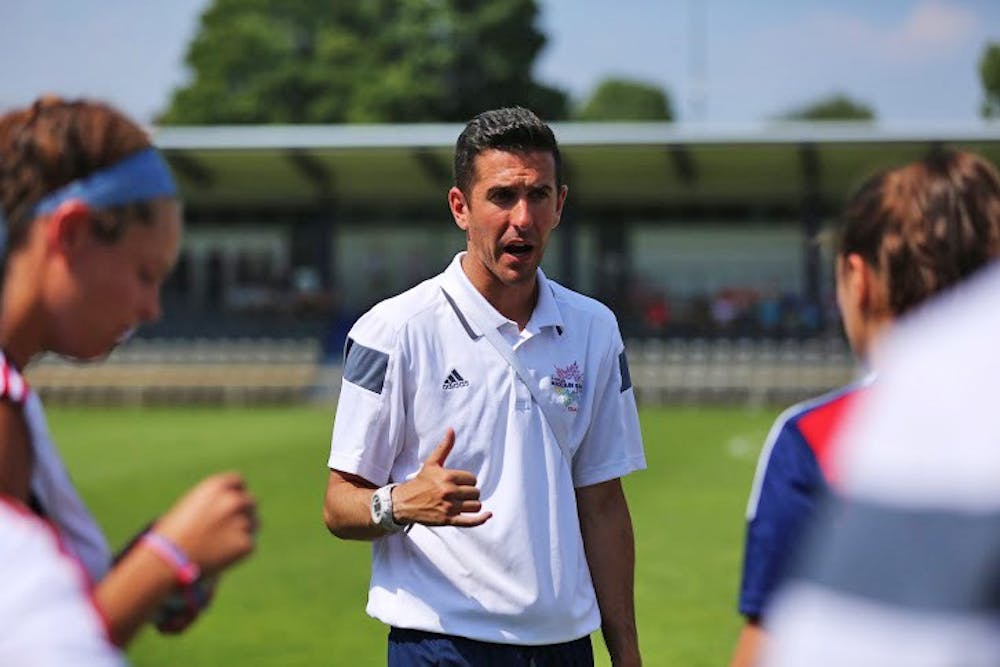Nemzer experiences Berlin, wins gold medal in Maccabi games
Assistant soccer coach leads Team USA to victory in 'Jewish Olympics'
While other Chippewa coaches spent the summer preparing for the 2015 season, Joe Nemzer was winning a gold medal with Team USA in Berlin for the 2015 Maccabi Games.
Nemzer, the assistant head coach for Central Michigan University’s soccer team, was selected to be the head coach of Team USA women’s soccer team for the summer games in Berlin.
Nemzer lead his team, consisting of primarily college-aged athletes, to a 4-0 record. Team USA won the gold medal with a 2-0 victory over the Swedish national team in the gold medal game.
Headquartered in Berlin, Germany, the Maccabi Games are often referred to as the “Jewish Olympics” as they are an international competition among Jews of all nationalities.
The Maccabi movement began in 1895 as multiple Jewish sports clubs came into existence throughout Central and Eastern Europe. It flourished as a direct result of the growing anti-Semitism and Jewish exclusion from sports clubs at the time.
While the games gave Nemzer a great source of pride by representing his country, he couldn’t ignore the impact of playing the games in Berlin, a place that was responsible for more than six million deaths of European Jews during World War II.
“The last time there were that many Jews in Berlin was during the Holocaust,” Nemzer said. “You hear that statistic and you can’t help but be emotional.”
This summer was the first time Nemzer had been to Germany.
“The feeling of being (in Berlin) was surreal,” he said. “You look at the old buildings and see where a lot of those bad things were headquartered. I know if I was in this space 70-plus years ago, my world would’ve been completely turned upside down.”
Nemzer’s grandfather, Morris Shenberger, was one of the many Jewish people to experience Germany’s anti-Semitic crusade across Europe. He spent time at the Auschwitz concentration camp while he was a teenager. Shenberger survived and eventually made his way to the United States where he started a new life.
Shenberger passed away at the age of 70 last winter, but had a lasting impact on his grandson.
Nemzer said his grandfather played an important role in his eventual decision to accept the offer and coach Team USA, but his influence stems deeper than coaching and into his personal life.
“He’s a person who has influenced me in everything I do,” Nemzer said. “He was someone who always looked for and found the best in everybody.
The way Shenberger responded in the midst of horrific circumstances has had a lasting impact on Nemzer and his family.
Despite the unfathomable hardships his grandfather faced and the memory of the terrible things that happened all those years ago, Nemzer’s pride is something that cannot be shaken easily.
“My grandfather and his story in the Holocaust, his brothers and sisters, you can’t help but feel even closer to them,” Nemzer said. “I think that was the most powerful part of the whole experience for me.
With the memory of his grandfather constantly in his mind, Nemzer received the support and encouragement from his staff and players back home throughout his time in Europe.
“It’s great anytime that you can have a colleague on staff to learn and grow from every day,” Head Coach Peter McGahey said. “It’s always a benefit for me personally and it’s great for our program.”
Junior goalkeeper Maddy Bunnell said the whole team supported Nemzer from the start while he coached Team USA.
“We’re all very proud of Joe,” Bunnell said. “He definitely brought back some energy off the (gold medal) win. It’s just a little bit of prestige to go into the season knowing that we have talent on our staff and trust in each other.”
Aside from bringing home the gold medal, Nemzer said the experience of being in Berlin brought him to “another level of closeness” with his grandfather and what he experienced more than half a century ago. When asked if he would do it all again, it didn’t take long for him to decide.
“Absolutely (I would go again),” Nemzer said. “You get athletes from around the country who share a similar set of values and backgrounds in relation to you. It was a really special environment.”







